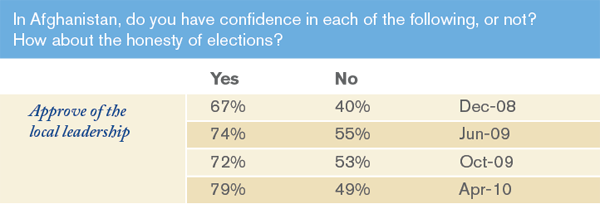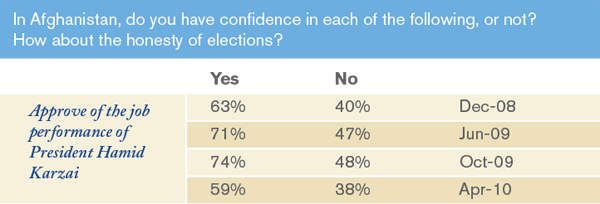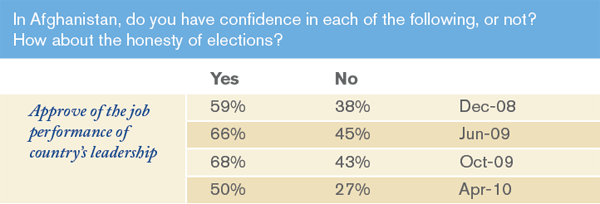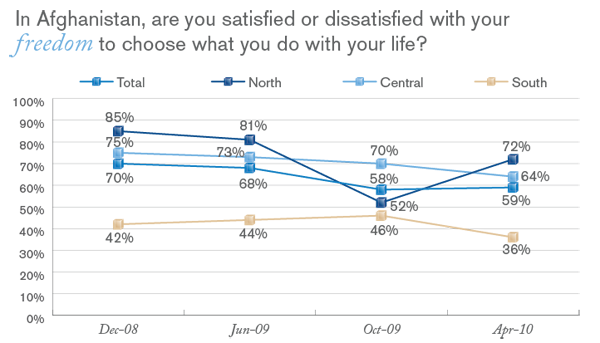A recent Century Foundation report describes the Afghanistan war as a stalemate and calls for immediate negotiations between the Afghan government and the Taliban. The diplomats, policymakers, and media debating the implications of the report are operating without a crucial piece of information. That is, what the Afghan people themselves would suggest to negotiate their own peace.
The report, "Afghanistan: Negotiating Peace," is the product of a year's worth of discussions with key stakeholders on all sides of the conflict spanning Afghanistan, Pakistan, India, and the international community. Co-chairs Lakhdar Brahimi, a UN diplomat, and Thomas Pickering, former U.S. undersecretary of state and U.S. ambassador to UN, India, and Russia, say that NATO forces will never be able to eradicate the Taliban. They argue the Afghan government should negotiate with the Taliban now - not in 2014, when the United States is scheduled to begin its withdrawal from the country. The issues at hand include global issues, including the Taliban's ties to Al-Qaeda, and internal issues the Afghans need to decide on their own, such as how to allocate power and the principles that would govern Afghan society.
Gallup's surveys of Afghans since 2008 provide an insight into what they would do if they had a seat at the table. This report analyzes Afghans' views on internal issues, particularly with regard to the division of power and the principles to govern their society, highlighting points of agreement and contention. Based on the surveys, this report makes the following key findings:
- Afghans support their local leaders more than their national leaders, indicating that in the future, they would benefit by having leaders that meet their specific regional needs
- Most Afghans would probably be open to an overhaul of the courts
- The country must make elections more transparent if it wants people to have faith in their government leaders
- An increased confidence in the military may indicate Afghans have more faith in local forces and that they will be ready to assume security duties after the NATO withdrawal
- Afghans agree that they want legislation based on Shari'a, and clerics involved in the legislative process
- Most Afghans support constitutional clauses for freedom of speech and freedom of assembly, but not freedom of religion
- Afghans are split on whether men and women should have equal legal rights
THE DIVISION OF POWER
Most of the survey results show that Afghans divide along regional lines on many issues. Respondents in the Northern region - dominated by ethnic Tajiks, Turkmen, and Uzbeks - and the Central region, which includes Kabul, often have different opinions from people in the Southern region - which is predominantly Pashtun and includes the Taliban strongholds of Helmand and Kandahar.
The Century Foundation Report finds that many internal problems in Afghanistan revolve around the division of power. Because every stakeholder in the country will want some control in the government, any negotiations would have to include compromises on power-sharing. To this end, Afghans need to discuss the following issues:
- How to allocate power for ministries, government appointments, and provincial posts
- How to address the current political order, including the role of elections in a future state
- How to determine control over the Afghan Security Forces
Approval Rating Vary by Region
Negotiations would have to account for the wide regional differences within the country - perhaps even more than differences in gender or social class. How the Afghan people view their current government provides an important backdrop to what they want from a future government - across all regions, Afghans tend to support their local leaders more so than their national leaders. In addition, Gallup surveys reveal that while Afghans have greater confidence in their local leaders now than in 2008, their confidence in their national leaders fell during the same time. In particular, many Afghans disapprove of the country's current president, Hamid Karzai. Approval ratings of all leaders vary across regions in the country and are consistently higher in the Northern and Central regions than in the Southern region.
Most Afghans approve of their local leaders
Gallup surveys indicate that in the future, Afghans would benefit by being able to pick local leaders who meet their specific regional needs. A majority of Afghans, 58%, supported their local leaders, according to the latest survey from April 2010. Approval levels vary by region; at least 61% of people in the Northern and Central regions approve of their local governments, compared with 45% of people in the South. Interestingly, approval levels in all regions have increased since 2008, perhaps an indication that all Afghans are steadily gaining confidence in their local leaders. In addition, because Afghan culture is steeped in tribal traditions and local leaders are likely from the predominant tribe of the area, people may trust them more than their national leaders, who are often from areas other than their own.

Afghans' approval of national leadership is falling
While Afghans have gained confidence in their local leaders over the years, with more than half of the people overall supporting their local leaders in 2010, Afghans across all regions lost trust in their national government between 2008 and 2010. Overall, half as many Afghans supported their national government in 2010 than they did in 2008, with approval ratings in 2010 standing at 30%. Approval ratings were highest in the North where 41% of the respondents said they have confidence in their national government in 2010. Approval was lower in the Central region (28%) and the South (21%) where less than one-quarter of respondents approved of their national government. That people in and around Kabul have a low opinion of their national government - likely because they are the closest to it and therefore feel the most disenchanted - shows how widespread disapproval in the government is. Across every region, confidence in the national government dropped especially between 2009 and 2010, suggesting far-reaching disillusionment with the government following reports of fraud and low security in the 2009 election.

Presidential approval falling
President Hamid Karzai's approval ratings hovered around 50% for many years, but fell below this point in 2010 when more people disapproved of his leadership (52%) than approved (44%). Karzai's approval ratings were lowest among women -- who gave him a 39% approval rating in 2010 (compared with 49% of men) -- and in the South, where he received a 37% approval rating. In the Northern region 51% of the population approved of Karzai's leadership while 43% approved in the South.
Confidence in the judicial process also low
Most Afghans would probably be open to an overhaul of the courts - and the laws they work under. Afghans have less confidence in the courts and judicial system than in any other national institution. As of April 2010, overall, 20% of Afghans said they approved of the country's courts. Though approval ratings are particularly low in the South, at 12%, approval ratings in the Northern and Central regions are 25% and 21%, respectively. This shows that across all regions at least two-thirds of the population opposes the status quo in the judicial system, an attitude that has been consistent over the years.

The drop in confidence in the courts, the president, and in the national government is not limited to any region, showing that in the event of a negotiated settlement, most Afghans would agree on bringing in new national leadership for the country. There has been some speculation that Karzai would like to stay on as president, possibly trying to rewrite the constitution to allow for more terms in office. Gallup's research suggests most Afghans would not approve of this approach. Considering that confidence levels dropped quickly after the 2009 election, it is likely that nationwide, Afghans would not only like changes in the country's leadership, but in the electoral process that determines it as well.
Changing the Political Order
The Gallup surveys suggest the country must reform the electoral process by making elections more transparent and free from fraud if it wants people to have faith in government leaders. More than two-thirds of Afghans are not confident in the current electoral process; in 2010, 27% of Afghans said they were confident about the honesty of elections, similar to the 30% who were confident in 2008. (These numbers are consistent with those of Egypt prior to its 2011 revolution.) Confidence in the electoral process was low among both urban (32%) and rural residents (25%) and across all three main regions. Though 40% of Afghans in the Central region showed confidence in the honesty of elections in 2009, these levels dropped to 28% in 2010 after the 2009 presidential election. Confidence levels in the North were also relatively low, at 30% in 2010, and lowest in the South, at 20%.

However, there is a strong association between confidence in the electoral process and government approval levels; people who are confident in the electoral process are more likely to approve of government leadership than those who do not express confidence in the honesty of elections. For example, of the people who believed in the honesty of elections in 2010, 79% approved of their local leadership, compared with 58% of the general population. In addition, 50% of people who had confidence in the honesty of elections approved of their national leadership in 2010, compared with 30% of the general population. Further, 59% of people who express confidence in the honesty of elections approved of Karzai, compared with 44% of the general population.



In every case, people who have confidence in the electoral process are also more likely to approve of their elected leaders' job performance. Unfortunately, with the relatively high approval levels for local leaders, most Afghans do not approve of their government leaders' job performance or in the electoral process that brings them to power. Regardless of whether they find value in elections or not, when negotiating a peace settlement, the Taliban will likely have to accept that elections will determine the division of power in a new Afghanistan.
Controls Over the Afghan Security Forces
Afghans have increased confidence in the military across all regions, a possible indication that they have more faith local forces will be ready to assume security duties after the NATO withdrawal in 2014. The Century Foundation report asserts that control over the Afghan Security Forces - including the Afghan National Army and the national police - will be controversial. According to the report, the senior officers of the army are mainly Tajik and Northern Alliance figures while Pashtuns from the South are viewed with suspicion, and therefore underrepresented.
Gallup research shows that Afghans' confidence in the military increased between 2008 and 2010, although approval levels are still much lower in the South than they are in other regions. As of April 2010, 55% of Afghans in the country said they had confidence in the military, compared with 46% at the end of 2008. In the Northern and Central regions, confidence in the military stood at 61% and 59%, respectively, while it was 41% in the South. Despite the relatively low confidence levels in the South, people's confidence in the military in this region has increased substantially since 2008. These changes could indicate that international efforts to integrate people from the South into the military are working.

PRINCIPLES TO GOVERN AFGHAN SOCIETY
In addition to resolving questions on how to divide power in Afghanistan, the Century Foundation report says Afghans must also decide on the principles to govern society, including the role of the 2004 constitution in a future state. To this end, all Afghans must come to a resolution on the following issues:
- The role of Shari'a in legislation, including the extent that Islam would influence basic law
- The tenets of a future constitution, including the basic freedoms that a constitution should guarantee
- How to guarantee women's rights in a future constitution
The Role of Shari'a in Legislation
Although the 2004 constitution already leans heavily on Islamic law, the Taliban would likely want stricter rules over dress and behavior and more roles for clerics in any negotiated settlement. Gallup research shows that an overwhelming number of Afghans would like government laws to be based on Shari'a at least to some extent, an opinion shared in most predominantly Muslim countries. Throughout the country, 94% of Afghans said they believe that Shari'a should play some role in legislation, with 56% saying it should be the only source. Support for basing the law solely on Shari'a remains strong among men (59%) and women (52%). In 2010, 63% of Afghans in the Northern region and 62% in the Southern region said Shari'a should be the only source of legislation in the country. In the Central region, roughly half of Afghans, 48%, said it should be the only source indicating a possible rift between people in the North and South on one side and people in the Central region on the other over the extent that legislation should be based on Shari'a.

Across all regions, Afghans also agree that their religious leaders should have a role in writing legislation. In fact, Afghans are only split on the extent that they believe their religious leaders should be involved, with 51% saying they should have an advisory role and 39% believing they should have a direct role. Four percent of Afghans believe religious leaders should not have any role in drafting legislation and the remainder said they did not have an opinion. Interestingly, Afghans in the North, where just over 50% of respondents said religious leaders should have a direct role in legislation, want clerics more directly involved in legislation than people in the Central and Southern regions, where about 35% of Afghans believed religious leaders should be directly involved.

Tenets of a Future Constitution
The Century Foundation report reasons that although the Taliban had little use for a constitution or elections when they ruled, they may desire concrete rules in a negotiated settlement to ensure they have can some power in a future government. While the Taliban would not likely support the 2004 constitution, it could be used as a starting point for a revised political system. Gallup asked Afghans across the country for their opinions on a variety of possible constitutional clauses relating to freedom. Afghans were split along regional lines on some, but not all of the issues.
Most Afghans support freedom of speech
Throughout the country, the majority of Afghans support provisions in a new constitution to protect freedom of speech (defined as allowing citizens to express their opinions on the political, social, and economic issues of the day) although ratings are higher in the Northern and Central regions than in the South. In 2009, nearly 80% of Afghans said a constitution should include a provision to guarantee freedom of speech, with 87% of those in the North supporting such a provision and 86% in the Central region saying the same. Although the percentage of people in the South who would support such a provision was much lower, at 59%, a majority of people in the region still support free speech.

Many Afghans do not support freedom of religion
Most Afghans said they do not believe a future constitution should have protections for freedom of religion. This is presumably because of devout adherence to Islam throughout the country. While just over 50% of Afghans said they would not include a freedom of religion provision in a constitution, such views vary greatly by region. In the Central region, which includes Kabul, the majority of Afghans (56%) would support a freedom of religion provision. In contrast, 23% of those in the North and 25% of people in the South said they would support a freedom of religion provision in a new constitution. Two in 10 people in the South either refused to answer the question or said they didn't know - far more than any other region.

Afghans also support freedom of assembly
In 2009, 73% of Afghans said they believed in freedom of assembly. Regionally, 74% of those in the North and 81% of people in the Central region said they would support a freedom of assembly provision while 56% of people in the South said the same. However, more than one-third of Afghans in the South refused to answer the question, possibly because of fears of answering the question after a rise in violence in the region during this time.

The data show that Afghans are split along regional lines on some, but not all, of the principles that would be included in a constitution. Although a majority of Afghans across all regions said they would include a freedom of speech provision, these majorities are much larger in the Northern and Central regions than in the South - indicating that a freedom of speech clause could be contentious. As for freedom of religion, only the Central region has a slight majority of people who would support it, with people in the North and South more strongly opposed to it. Since the data show that most Afghans do not believe in freedom of religion, including this clause to protect religious minorities could be contentious. Nationwide, Afghans also agree on including a clause for freedom of assembly in a constitution, even after accounting for the large number of people in the South who did not answer the question, showing that this would not likely be a divisive point in negotiations.
The Rights of Women
Women do not feel free
Considering the Taliban's record of disenfranchising women from the workforce, politics, and society, securing women's rights in a future constitution will likely be contentious. Gallup research shows that 48% of women said they had the freedom to choose what they want to do in their lives, compared with 71% of men - a difference of 23 percentage points. Women have also become more pessimistic about their opportunities as the war has continued; in 2008, 66% of women said they were satisfied with the freedom to do what they wanted in their lives.

All Afghans -- particularly those in the South -- would likely have a lot to gain from changing the current constitution to better ensure their own personal freedoms in the future. Among men and women, people from different regions view their own personal freedoms differently. Although 59% of Afghans in 2010 expressed satisfaction with the freedom to do what they want in their lives -- proportions varied significantly from region to region. In the South, 36% of Afghans said they were satisfied, less than the proportion of women nationwide, compared with 72% of people in the North and 64% of those in the Central region. Across all three regions, people were less satisfied with their personal freedoms in 2010 than they were in 2008.

Granting women equal rights
Men and women also disagree on whether women should have the same legal rights as men. As of October 2009, 64% of men and 74% of women said women should have the same rights as men. The differences were starker along regional lines; in the South, 50% agreed that men and women should have equal legal rights while 42% disagreed, the remainder did not answer the question. In contrast, 68% of those in the North and 80% of people in the Central region agreed that men and women should have equal rights. These differences underlie the difficulty of negotiations between the Afghan government and the Taliban on issues pertaining to women's rights, as men and women nationwide agree more than do people in the different regions.

Women in the workforce
People in different regions also have strong differences on whether they think women should be allowed to work. In October 2009, 58% of Afghans said they think women should be allowed to hold any job for which they are qualified - with 50% of men agreeing and 67% of women agreeing, a difference of 17 percentage points. Along regional lines, 53% of those in the North agree that women should be allowed to hold any job for which they are qualified, compared with 72% of people in the Central region and 40% of those in the South. With views in the Central and Southern regions differing by 32 percentage points, the issue of whether women can work outside of the home will likely be contentious in any negotiations.

Moving Forward
Nationwide, Afghans are split along regional lines on several issues, particularly on the extent that legislation should be based on Shari'a, the role of women in society, and on issues of the responsibility of military power. Although nearly all Afghans say national legislation should be based on Shari'a, people in the North and South want a stronger reliance on Shari'a than people in the Central region. The three regions also have widely different opinions on the roles of women in society, with far greater proportions of people in the Northern and Central regions saying women should have equal rights and the ability to work outside of the home than in the South. These differences are important and would make any negotiations on these issues controversial.
However, there is agreement on some issues across different regions. Although people in the South are consistently less likely to approve of their leaders' job performance and to have confidence in some institutions than people in the Northern and Central regions, results show some points in common. For example, nationwide, all Afghans are more likely to approve of the job performance of their local leaders now than in 2008. At the same time, they express less confidence in their national leaders' job performance, the president, the electoral system, and the courts. This suggests that Afghans may be open to an overhaul of their current political and institutional system. In addition, with the exception of granting equal legal rights to men and women, Afghans across the three main regions generally agree that they would include certain basic freedoms in a new constitution - including freedom of speech and assembly. While ironing out the differences will be difficult, there are certain issues that Afghans agree upon, which they can use as a starting point to launch negotiations.